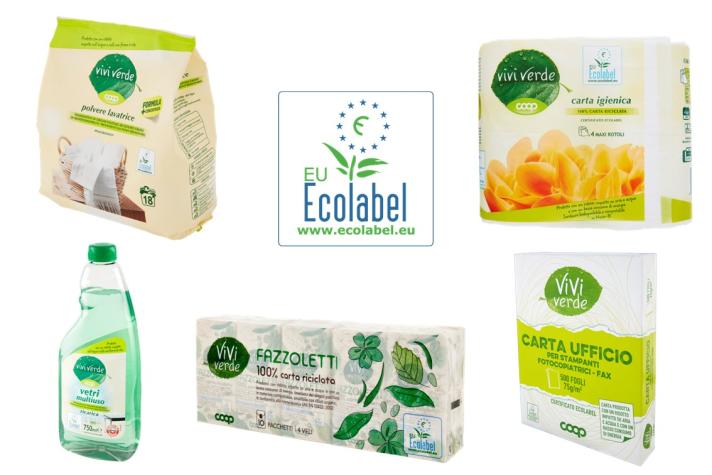Coop Italia is a network of supermarkets and hypermarkets made up of 75 member cooperatives nationwide. It represents nearly 60,000 employees in 2,236 retail outlets, and last year generated EUR 16.1 billion in turnover. Sustainability, health, and fair trade are core principles of the Coop’s growth strategy. Coop Italia stores sell around nine million EU Ecolabel-certified products each year, including under its famous own brand Vivi Verde. These products can be purchased in-store or online. In 2022 alone, products bearing the EU Ecolabel ‘flower’ logo turned over EUR 15 million, a true success in the competitive retailing sector.
A pioneer for EU Ecolabel presence in retail
Coop Italia recognised very early the added value of investing in the EU Ecolabel. The journey started in 1999 when the group became the first large-scale retail chain to introduce an EU Ecolabel-certified tissue paper product in Italy. In 2009, the group developed its green store brand, Vivi Verde, to expand these sustainable values also to food and non-food products. Marketing the Vivi Verde brand together with the prestigious EU Ecolabel logo helped to build consumer confidence. Coop Italia has continued to expand its EU Ecolabel products within the Vivi Verde line growing up to 13 in 2023 under the of copy and graphic paper, tissue paper, dishwashing detergents, all-purpose cleaners, and laundry detergents product group categories.
A prominent positioning in-store accompanied by promotional activities ensure robust sales of these products. For example, the EU Ecolabel copy and graphic paper products today comprise 15% of the Coop Italia’s paper sales. Building on the success of their EU Ecolabel products, Coop Italia is now actively seeking to increase its engagement with the scheme. At least two new EU Ecolabel certified products are already foreseen for 2024 (kitchen paper and serviettes).

Saving the environment doesn’t just mean planting more trees and keeping the seas clean, it also means ensuring well-being and quality of life for us and future generations. This is what Coop Italia has always done, including through its branded products that are EU Ecolabel certified.
Vivi Verde, successfully capturing the green market
More and more Italians now express concern about the environment and responding to a recent Eurobarometer survey, the vast majority said a product’s impact on the environment was ‘very important’ (33%) or ‘rather important’ (50%) when making purchasing decisions. The EU Ecolabel is well known logo in Italy, being recognised by as many as 49% of surveyed citizens.
To address the growing demand of ‘green’ products, Coop Italia plans to launch up to 5,000 new Vivi Verde green products (including EU Ecolabel certified) in shops and online over the coming years, and more is to come.
Benefits for retailers
Coop Italia has learned that spreading a culture of sustainability along the whole value chain – suppliers, consumers, and members – ultimately saves on costs (e.g. energy, material resources etc.) while boosting the group’s turnover and image. The supermarket chain is proof that selling EU Ecolabel products boosts sales, for both its own-brand products and other products, along with the store’s overall ethical standing, further building consumer trust and tackling greenwashing.
The successful experience of Coop Italia can be truly inspiring for other EU retailers. By adding EU Ecolabel products to their shelves and marketing them in-store and online, European retailers not only encourage consumers to purchase and consume environmentally friendly products but also seize new business opportunities. That’s a win-win-win for the consumers, retailers, and the environment.

